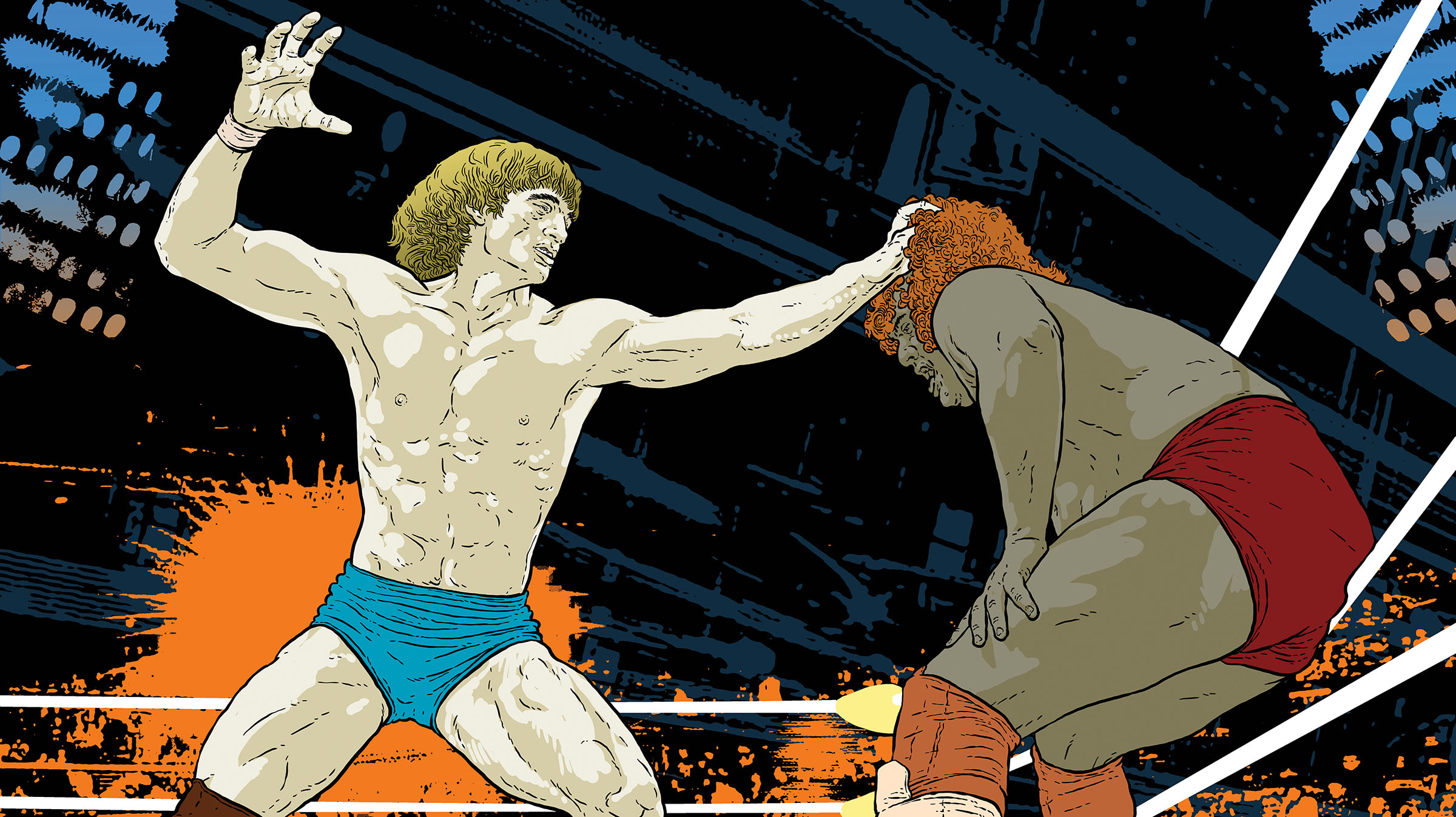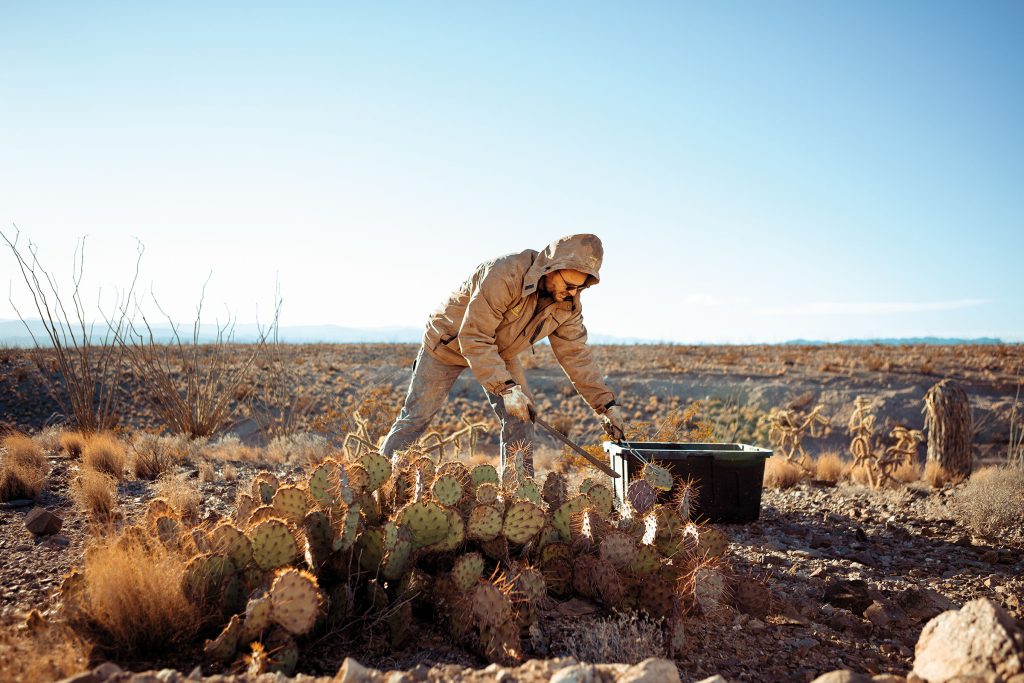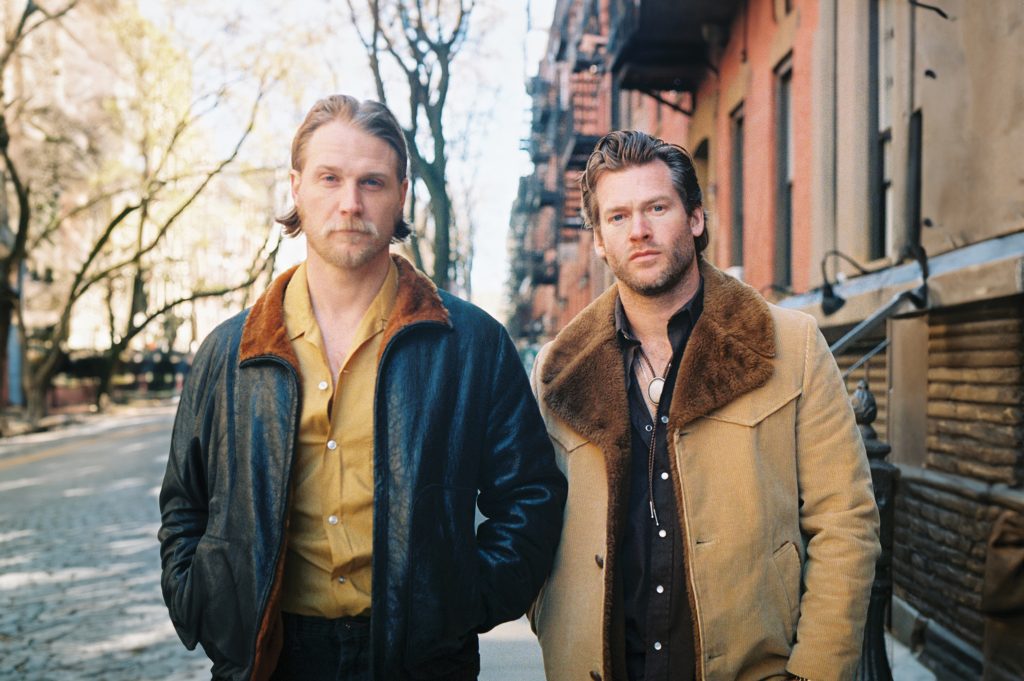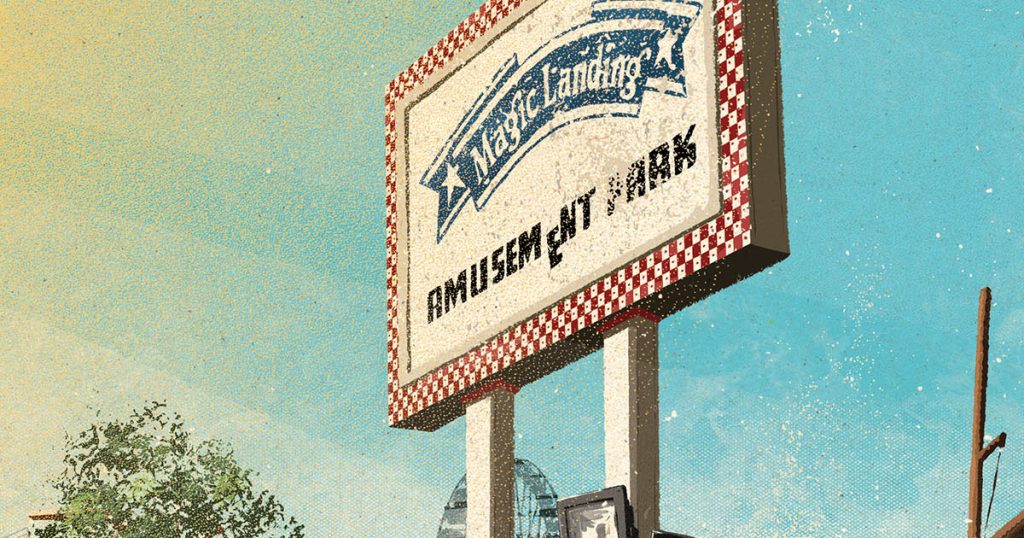
Illustration by Jan Feindt
A vacant lot just south of downtown Dallas is all that’s left of one of the most influential regional professional wrestling companies in America—the arguable birthplace of mainstream wrestling as we know it today. That lot once housed the iconic Sportatorium arena, long-since demolished. There, starting in the 1960s, wrestler and promoter Fritz Von Erich led what would become World Class Championship Wrestling and launched one of the sport’s most memorable dynasties, with five of his sons serving as the stars. The eldest of the group, Kevin Adkisson, aka World Wrestling Entertainment Hall of Famer Kevin Von Erich, spent week after week tossing people around the ring alongside his brothers. Kevin is the only Von Erich to outlive his father.
The North Texas wrestling family and its tragic story recently received the Hollywood treatment in The Iron Claw, released last December featuring Zac Efron as Adkisson. In real life, the 67-year-old retired wrestler recently moved back to Texas from Hawaii. Now, he and his family live on a ranch in Boerne that includes a barn they rent out as a wedding venue. It’s an extension of Adkisson’s lifelong conviction, unshaken by the relentless loss he’s faced, that nothing is more important than God and family. “I want to send a message to young fellas out there to quit messing around and marry that girl,” says Adkisson, who has been married to his high school sweetheart, Pam, for 44 years. “It’s the best time of your life.”
These days, Adkisson mainly focuses on his wife, his four children—two of whom are wrestlers—and his 13 grandchildren. “I really don’t answer the phone anymore, but when my grandson grabs my finger and says, ‘Play monster trucks!,’ I’m there,” he says. “I love that. I don’t think I’m getting old very fast because he’s keeping me young.”
TH: What was it like growing up in Denton County? The film portrayed it as pastoral.
KVE: We lived on a 60-acre ranch that my dad bought, on two parcels about a mile away from each other. Then we had all that land to roam on. We rode everywhere on horseback in those days, and often rode bareback so we could ride right into the water. My dad was a big duck hunter and did field trials, so we all had black Labrador retrievers. Everywhere we went, we had our dogs with us. The other thing I remember is that we had so many blackberries. We ate handfuls of blackberries every day. Chocolate milk and blackberries—that was what we were all about.
TH: Did you always want to become a professional wrestler?
KVE: No, actually football was all I thought about. I was probably better in track, but I just loved football. I played fullback at UNT [then North Texas State University]. Hayden Fry was the coach. I was so dead set on being a pro football player, I never even thought about wrestling. But then I had my first knee surgery, and then another, and then two more. In wrestling, you can kind of go to your belly and put your knees out of the way, but in football, tackles and blocks are directed to your knees. Even with wrestling, you’ve got those leather boots on, and we sweat so much in that ring that my boots would get heavy—the socks would soak up that sweat, you know. That’s why I began to wrestle barefoot. Because it felt so good to have that weight off my knees.
TH: When did you first visit the Sportatorium?
KVE: On Mondays and Tuesdays, my dad would go to the office—and that was the office. My brothers and I would always go with him so we could play around and wrestle in the ring. We’d spent most of our lives out in the country and had never really seen a big city like Dallas. So, we’d just roam around.
TH: Now your sons wrestle as well. What was your reaction when they told you they wanted to join the family business?
KVE: It was kind of crazy. It’s really hard on you—you wrestle about six, seven nights a week, sometimes twice a day. You wind up bearing your injuries. You’re used to being sore, but these injuries are supposed to be alerting you that you might need to, say, get a broken bone fixed. My shoulder’s different now from healing wrong after being broken, and my thinking that it was just sore. I said to ’em, “You don’t want to be like me. I used to run the high hurdles, and I love to run, but now I can’t.” They just looked at me like I was talking to the wall. I was like that with my dad. My dad didn’t want us to wrestle. But all I could think of was to just do what my dad did. To me, that was the natural course, and all my brothers felt like that. We loved him. We thought he was great.
TH: Can you tell me about the recent speaking engagements you’ve been doing?
KVE: With this movie coming out, things have been wild. My phone rings off the wall, driving my wife crazy. Really, they don’t ask me much at all about the movie. They just kind of saw it long distance and made some assumptions. I didn’t want to complain about little details. Because what’s there to gain? It’s done. I want people to enjoy the movie, and so I endorsed it. I thought it’d be good for my sons and good for the wrestling business.
We wanted to tell my side of it. It’s important for me. My dad was that kind of man, and my brothers were just so good. They weren’t what you might see with the sensational stuff on YouTube. They were really considerate and good and honorable. That’s what I want people to know, so I’m going to tell little stories that I remember with my brothers and my dad, and then also funny stories from the road.
TH: If you could change just one thing about the movie, what would you change?
KVE: There’s quite a few. My wife is a sweet, little, soft-spoken lady. She was my high school girlfriend, and we’ve been married for so long. But in the movie, Pam pursues Kevin! She kind of hustles him. When we watched, I looked over at her and she was biting her tongue a little bit. Anyway, it was me; I pursued her. I wish I could make that change for her. But in general, they’re tiny details.
TH: What do you hope people take away from your story?
KVE: It was a bad 10 years—those 10 years that I lost my brothers. And then to try to cram that down into a two-hour movie—there are some sacrifices. But there are a lot of sad stories out there. I hope that it can be a real positive thing, that people can see that even when I was so far down—I had been knocked down over and over—I knew God was with me. He’d talk to me, and I couldn’t be more grateful to learn what I’ve learned—to not waste time arguing and things like that, to try to enjoy every minute because they’re all going so fast.
Stream The Iron Claw on available platforms, a24films.com/films/the-iron-claw.








